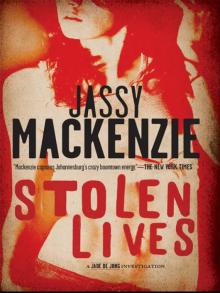- Home
- Jassy Mackenzie
Folly Page 2
Folly Read online
Page 2
I feared what I had just said to Da Silva would be the first of a regiment of lies.
‘Please, sit down,’ I added. ‘Something to drink?’
While I made instant coffee, Da Silva settled himself at the dining-room table and took out a folder crammed with paperwork.
‘Right. I’ll get the bad news out of the way first,’ he said, as I approached the table. My nerves were wound up so tight that, on hearing these words, I slopped a considerable amount of the mug’s contents onto the floor.
I placed the mug down well away from all the pristine paperwork and hurried to mop up with the last of the paper towels on the kitchen roll before taking a seat opposite him.
‘Unfortunately, we’ve made no further progress with Federal Surety,’ he said. ‘It looks like this is going to end up as a stalemate. If I were you, I’d accept their goodwill settlement offer, which I think in the circumstances is fair, and leave it at that.’
‘Right,’ I said. ‘That’s the best you can do, then?’
Da Silva gave a small nod, the gesture managing to convey both sympathy and smugness.
When Mark had a head-on collision with a truck at the beginning of last year, he’d had both accident insurance and medical aid. Unfortunately, the premiums were debited from his current account, which had been overdrawn for just a couple of critical months, causing them both to be rejected.
So simple and yet so cataclysmic. Mark would never have let an insurance premium lapse intentionally – he was a stickler for doing things the right way. I think, though, that in the stress of starting up another business venture that already looked like it was going to flop, he simply hadn’t realised that the debit orders had been returned. And before he could do anything about it, an eighteen-wheeler had ploughed into him.
‘I’d take it, if I were you,’ Da Silva advised in his patriarchal tone. ‘You’re not going to get any more out of them. That money will cover my bills and it should give Mark another two or three months in Rest Haven.’
Rest Haven. The expensive private care home where my seriously brain-damaged and physically disabled husband now resided.
‘What’s the good news?’ I asked.
Da Silva looked startled, as if I’d caught him out by asking for it. His immaculately manicured fingers drummed out a little tune.
‘Ah. That. I’ve submitted the Road Accident Fund claim,’ he said. ‘You may have to wait another year or two for the payout, but it should come eventually. At least that’s one thing we can look forward to, eh? Now, have you put this house on the market yet?’
His words were like a direct blow to my solar plexus.
‘The house … no. No. Not yet. I’m still considering my options. I may … well, I may move into the cottage and rent the house out.’
‘Rent it out?’ Da Silva echoed.
‘Yes. It’s a nice big place. I’m sure—’
‘But Emma, it’s not rentable. Not really liveable at all, is it? It’s barely half-completed. None of the downstairs finishings are done – I don’t know about upstairs. You haven’t even got ceiling lights. None of the south-side windows are installed – have you forgotten why those boards are nailed to the wall? You don’t even have a kitchen sink.’
Well, that wasn’t my fault. We’d run out of money to pay contractors and I’d given up asking Mark to install a sink himself – not that he’d ever been a great one for diy in any case.
‘Just stop nagging me,’ Mark had barked at me eventually, exasperated by yet another of my pleas as I hauled the dishes outside to wash them in the large concrete sink in the back yard. ‘When I say I’ll do something, I’ll get it done, ok? You don’t have to keep reminding me about it every six months!’
Now Da Silva was peering at the other, smaller gap in the kitchen counter. ‘And what happened to your stove?’
‘I sold it,’ I admitted, and saw his lips purse.
‘The cottage – what did Mark used to call it – the folly? That’s finished, isn’t it?’
‘There’s a tenant renting it at the moment.’ Who, I had just realised, was more than two weeks late with her monthly payment.
‘If you were to sell, a buyer could live there while he completed the house.’
Was it my imagination or had Da Silva put unnecessary emphasis on the word ‘he’? Not that I was a shining example of the self-sufficiency of womankind right now, but still.
‘Even so, this place won’t be easy to move, so I’d really advise putting it on the market as soon as possible and seeing what offers you get,’ Da Silva continued.
The house had become home to me. I had forgotten its shortcomings. In any case, there wasn’t only me to think about.
There was also Goodness, his wife and their three children. There were my two retired horses, and the four rescue cats, one of whom, Sparkle, was even now leaping onto the table and approaching Da Silva’s folder with a purposeful look in his eye. Quickly, Da Silva shuffled the folder closed and replaced it in his briefcase.
‘I’ve got a few very promising job interviews lined up,’ I said, weakly.
Then I waited. If a lightning bolt was going to fry me it would probably happen now.
‘That’s good news. Finding employment needs to be a priority for you, whether or not you sell the house.’
I couldn’t help but scowl. Did he honestly believe that the thought of getting work hadn’t yet crossed my mind?
And then I realised that, thanks to the scurrilous details about my past that I suspected Roger had drip-fed him over the years, Da Silva probably did think exactly that.
‘You lost your job how long ago? Six months?’
I bristled. ‘I was retrenched when the company went insolvent, and that was four months ago now.’
‘That’s a long time to be without work. You should look at renting a smaller place in a more built-up area. For a woman on her own, living on a large plot like this is both costly and unsafe.’
‘But I’m not …’
He steamrollered right over me. ‘As Roger has said, you need to try to view what has happened to you in a positive light, and use it as an opportunity to make changes for the better, and to start taking more responsibility.’
Oh, right. With that comment, I knew Da Silva had definitely heard all about my past. How could I have thought my brother would have kept it a secret? I had to force myself to bite back a vicious response.
Instead, to make myself feel better, I looked at Da Silva and I visualised him naked.
Not just unclothed, but stripped bare and face down on the plastic dining-room table, arms and legs splayed out, trussed by his wrists and ankles to the table legs with yards of kitchen string.
I imagined how he’d crane his neck and roll his eyes in alarm as I stalked towards him, all his smugness evaporated.
‘Well, well,’ I would say to him. ‘What a lovely table decoration you make, Mr Da Silva. A truly spectacular centrepiece. There’s only one problem. Every centrepiece should have a candle, shouldn’t it? And now … let me think carefully … I have one here in my hands. Where do you think will be the best place to put it?’
‘Emma!’ Da Silva’s voice cut sharply into my fantasy. ‘Are you laughing at something?’
‘Better to laugh than cry,’ I rejoined, which did nothing to wipe the frown from his face.
Da Silva snapped his briefcase shut and stood up, clearly ready to leave. I bid him goodbye in falsely cheerful tones as I showed him out, just in case he thought he was the only one of us who could do phony emotion.
Back in the living area, the trussed-up spectre of Da Silva had vanished from the dining-room table, and my imagination was powerless to summon it back. The thought of sitting down again and trying to calculate a nonexistent budget no longer appealed. I decided instead to go and extract the rental money from my tardy tenant.
Chapter 3
The cottage that Hayley, my tenant, rented was set in front of the main house and separately fenced, with its own
entrance. It was the first dwelling that we’d built on my land – his folly, Mark had nicknamed it. Octagonal in shape, the hi gh-roofed cottage had two downstairs rooms – a small bathroom and a spacious lounge-kitchen – and a mezzanine bedroom above.
We’d lived happily in the folly for years until Mark had decided it wasn’t good enough. That we needed a bigger place. And so construction for the main house – aka The Palace – got underway, with machines groaning as they levelled the ground, builders pounding away with hammers and mallets, scaffolding bristling upwards around the walls. Unforeseen cost after unforeseen cost. The massive increase in the price of cement. The local unavailability of the granite kitchen surfaces we’d wanted, which had finally arrived in the country and had been installed just before we’d run out of money. The Great Stove Debate, which had culminated in Mark’s decision, financially disastrous in hindsight, to import a Nardi hob from Italy.
I realised as I walked towards the green palisade that I hadn’t actually been to the folly since Mark had rented it out. With another person occupying it, the building had no longer felt like it was ours and I had stopped thinking about it. I hadn’t even had cause to go round to the front gate.
Hayley was a Goth-type with dyed black hair and pale skin, who always dressed as if she was going to a funeral and, I remembered Mark saying, had a nightclub-related job that kept her busy from late afternoon until the small hours of the morning.
Her black Opel Corsa was parked under the steel carport. The parking area had originally been paved, but now I noticed that thick, toughlooking weeds had invaded the brickwork. The grass in the garden must have been a foot high, and the overgrown flowerbeds provided further tangled proof of Hayley’s lack of interest in her outdoor environment.
I scowled in frustration. The rental agreement had stated that Hayley was to take care of the garden. At one stage, she’d paid Goodness to cut the grass and tidy the beds for her. Obviously that arrangement had fallen by the wayside.
I pressed the yellow button on my buzzer and her gate rattled open. Then I walked up the short stretch of lawn, grass grabbing at my ankles, and knocked on the front door.
I had to knock four times before I got a reaction, and then it was clear that I’d woken Hayley up. She unlatched the door and peered out, shielding her blue eyes against the cruel blaze of the morning sun. Her hair hung in dishevelled locks around her shoulders and, under the oversized charcoal T-shirt she wore, her legs looked pale as bones.
‘Sorry to wake you,’ I said. ‘I just wanted to remind you that you’re overdue with the rent.’
Vaguely, I registered that the folly looked pitch black inside. Hayley must have hung blinds over the windows in order to block out the daylight so she could get some sleep between her crazy shifts.
‘Yes, I know. I tried to call you on Monday but your phone wasn’t working,’ Hayley said. ‘I wanted to tell you I’m giving notice. I’ll be leaving at the end of the month. I paid a deposit when I came here, so you can just keep that in lieu of this month’s rent, if that’s ok.’
‘What?’ I gaped at the girl in disbelief.
Her rent was the income I’d been relying to get me through the rest of the month. The horses’ hay. Goodness’s wages. Money for food and water and electricity.
And something … something for the bond.
‘You should have told me at the beginning of the month,’ I managed to sputter.
‘Well, I tried. I left a message, and then I tried to phone you last week. Twice.’ Hayley’s pale chin jutted defensively. ‘There’s only so much I can do. I actually didn’t want to give notice but, you know, having the power go off for days on end is really inconvenient.’
‘I’m sorry,’ I said. ‘It was … er, because of an invoice dispute with the supplier. Their mistake, of course.’
She said nothing in reply; I could see she didn’t believe me.
I was about to turn away, defeated, when I heard a snuffling from inside the house and Hayley opened the door wider to allow her dog, a black spaniel, out into the garden.
And that was when I saw it.
Blinds over the windows as I’d expected, yes. But the walls – those lovely eggshell-white walls … Hayley had painted them pitch black.
Without asking anyone’s permission, she’d redecorated the entire interior of the cottage, Gothic morgue-style. It was so dark it looked like negative space. Dear God, she’d even painted the ceiling, and the wooden bookcases that had been built into two of the octagon’s sides were now a matte black in colour. The only trace of illumination in that unholy place came from a single ray of light that shone down onto the grey tiled floor from the gap in a badly fitting blind.
I stared, horrified.
This cottage was unlettable in its present state to anyone except a member of the Addams family. My brain recoiled from the costs this represented. The hours and hours of stripping and sanding, then the painting – to take it from dark to light again would take at least a fortnight, not to mention multiple coats of paint, and would probably cost the equivalent of six months’ rental.
And that, for me, was the final straw.
I took a deep breath and squared my shoulders and glared at Hayley. The fury I felt must have been written in bold on my face, because I saw her actually wince.
‘Who gave you permission to repaint?’ I shouted.
Hayley blinked rapidly. ‘Well, nobody, I … I’ve been here so long, you know, I thought …’
‘You thought? You honestly thought you were going to be able to get back your deposit after leaving the premises in this ruined state?’
‘It’s not ruined …’ she tried, in a very small voice.
‘Oh, yes, it is. You will not be getting your deposit back unless, before you leave, the walls and ceiling and bookcases are all restored to their previous colour. And in the meantime, you owe me the full rent for this month. I want that money transferred into my account by the end of today, or I will charge you interest.’
‘Yes,’ Hayley whispered, cowering back into the doorway. ‘Please, I will do. Please stop shouting, Mrs Caine. I’m sorry.’
My heart was pounding with adrenaline from the outburst and, surprisingly, I found the sensation exhilarating. Gathering my rage around me like a cloak, I turned and strode away.
Chapter 4
Hayley deposited her rent within an hour. Five minutes after that I’d emailed the supplier with the feed order for the horses and paid Goodness his wages for the next fortnight, paid the electricity and paid the water bill.
After doing all that I looked at the pittance that was left in my account and I felt the same sick clench of fear in my stomach that I’d felt earlier.
And, as of next month, I had an unlettable cottage.
What if I took the advice that both my brother and his lawyer were all but ramming down my throat? What if I sold the house for whatever I could get? Made other hard decisions? Retrenched Goodness, who was like family to me, and which would mean him and his wife and children would have to move out and go … Go where? To the nearby informal settlement of Diepsloot and look for work, I supposed. For them, as outsiders, life in that ghetto would be extremely difficult, and jobs were certainly not easy to come by.
I’d have to ask my vet to humanely destroy my horses. What else could I do with them? At seventeen and twenty-two years old, they weren’t exactly in their prime. And I would probably have to re-home, or euthanise, my cats, given the standard no-animals policy in most modern flats and cluster developments these days.
And what then? What if, another six months down the line, I still had no job?
The unthinkable prospect of moving to Cape Town and throwing myself at my brother’s mercy got me up from my chair and marching out of the house.
‘There must be something else I can do,’ I said aloud, as I walked through the back garden and down towards the wire-fenced vegetable patch, causing Admiral to raise his head and regard me curiously. The vegetable patch had
been badly neglected this past year, and only Goodness’s tireless work and some natural reseeding had ensured there was anything growing there at all. The sweet basil and garlic chives, spinach and land cress were doing well, and a cherry tomato bush was thriving in the far corner.
‘There must be some way of making enough money to keep this place. Even if it means selling my body.’
I gave a short, bitter laugh at that joke.
Bob the Cat, the oldest and friendliest of my four felines, sauntered over to greet me with a chirrupy meow. Bending down, I rubbed his head and listened to the comforting rumble of his purring.
‘Poor choices, Bob,’ I said aloud to him. ‘That’s what has landed me here.’
He glanced up at me with a look devoid of sympathy. In Bob’s world, the cat food was still arriving in the bowl and the pillow next to mine was his reserved night-time sleeping spot. ‘What could possibly be so bad?’ he seemed to be asking.
Now, though, I couldn’t help thinking of the idiotic things I’d done when I was younger that were partly responsible for my current all-time low point. Bad decision after bad decision, and now I was firmly stuck in the mess I’d created for myself.
I’d dreamed of becoming an actress or a radio dj when I’d finished school, but my parents had made it clear that such frivolous career choices would not be supported. Instead, I was told I should follow in Roger’s footsteps and complete a university degree in something ‘worthwhile’ – preferably business.
I had ‘compromised’ by leaving home straight after I’d done my final exams and moving into a tiny flat with three of my friends. I got a job at a local steakhouse and within the short space of just eleven months had succeeded in achieving a promotion from junior waitress to ordinary waitress. Attaining the dizzying heights of management, it seemed, was not meant for me, nor had I been offered a lateral promotion to assistant chef. But I was happy enough. I was acting in local productions and doing occasional work as an extra in movie shoots. I was half-leasing an ex-racehorse. I was dating a succession of interesting young men whom my parents considered as unsuitable as my job: musicians, arts students and university dropouts with ponytails and pierced ears, dope habits and heads full of dreams.

 Pale Horses
Pale Horses Bad Seeds
Bad Seeds Random Violence
Random Violence Folly
Folly Stolen Lives
Stolen Lives The Fallen
The Fallen Soaring
Soaring Drowning
Drowning